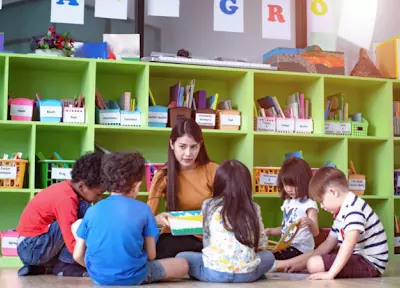We often hear that it takes a village to raise a child, and nowhere is this more evident than in the realm of education. Parents play a crucial role in shaping our children’s academic journey and Education isn’t just about what happens inside the classroom—it’s a journey that extends to every corner of a child’s life.
Parental involvement in this journey is not just beneficial; it’s essential. The more engaged you are, the more your child will thrive academically, socially, and emotionally.
Here are ten practical and impactful ways that The Blue Bells School promotes to all parents to get involved in their child’s education, ensuring that learning becomes a lifelong adventure.
- Create a Learning-Friendly Environment at Home
Imagine trying to study in a noisy coffee shop. Now imagine doing the same in a quiet library. The difference is clear. Setting up a dedicated, distraction-free space for your child to study can work wonders. Ensure it’s well-lit, stocked with necessary supplies, and free from interruptions.

- Encourage Reading
Books are windows to the world. Encourage your child to read regularly by setting an example. Whether it’s bedtime stories or joining a book club together, your enthusiasm will be contagious. Discuss the books you read and explore their themes, characters, and plots. It’s a fantastic way to bond and enhance comprehension skills.

- Be Curious and Ask Questions
Show interest in what your child is learning. Ask open-ended questions about their day at school, their favourite subjects, and any challenges they might be facing. This not only shows you care but also helps reinforce their learning and critical thinking skills.
- Stay in Touch with Teachers
Teachers aren’t just educators; they are partners in your child’s development. Regular communication with them can provide insights into your child’s progress and areas where they might need extra support. Attend parent-teacher meetings, and don’t hesitate to reach out via email or phone if you have concerns or questions.
Our educators at The Blue Bells School make sure that parents are updated with the progress of their children, the strengths and weaknesses they face in their daily routine along with dedicated activities for parental involvement.
- Help with Homework—But Don’t Do It
Homework is an opportunity for students to practise what they’ve learned. While it’s crucial to offer help and guidance, resist the temptation to do the work for them. Encourage independence by helping them understand concepts and solving problems on their own.

- Volunteer at School
Get involved in school activities. Whether it’s chaperoning field trips, helping out at events, or joining the PTA, your presence shows that you value education. Plus, it’s a great way to connect with other parents and understand the school’s environment better.
- Set Realistic Goals and Celebrate Achievements
Setting goals gives children something to strive for. Help your child set realistic, achievable goals for their academic and personal life. Celebrate their achievements, no matter how small. This boosts their confidence and motivates them to keep going.
- Incorporate Learning into Everyday Activities
Learning doesn’t stop when school does. Turn everyday activities into educational experiences. Cooking can teach maths and science, grocery shopping can involve budgeting and planning, and trips to museums or parks can spark curiosity and exploration.

- Encourage Extracurricular Activities
Education extends beyond academics. Encourage your child to participate in extracurricular activities like sports, music, art, or clubs. These activities help develop social skills, teamwork, and a sense of responsibility.
- Model Lifelong Learning
Children learn a lot by observing their parents. Show them that learning is a lifelong process. Pursue your own interests, take up new hobbies, or attend classes. Your enthusiasm for learning will inspire them to value education and continuous growth.
We believe that a collaborative approach between parents and educators creates the best environment for children to flourishBy hosting regular parent engagement workshops, we encourage active participation in school activities, and maintain open lines of communication. By working together, we ensure that each child receives the support and encouragement they need to succeed.
Your involvement in your child’s education is like sunshine to a plant—it helps them grow and thrive. So, roll up your sleeves and get involved. The journey might be challenging, but it’s also incredibly rewarding, and your child’s bright future is worth every effort.




